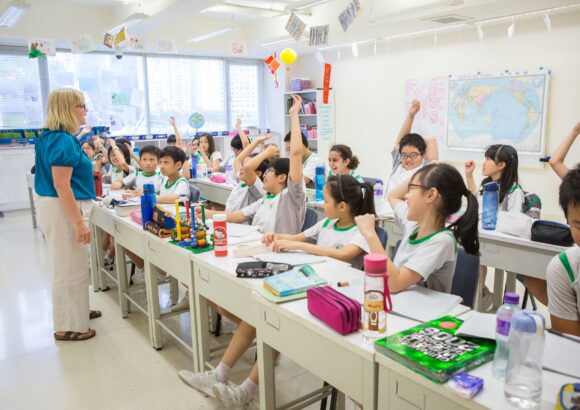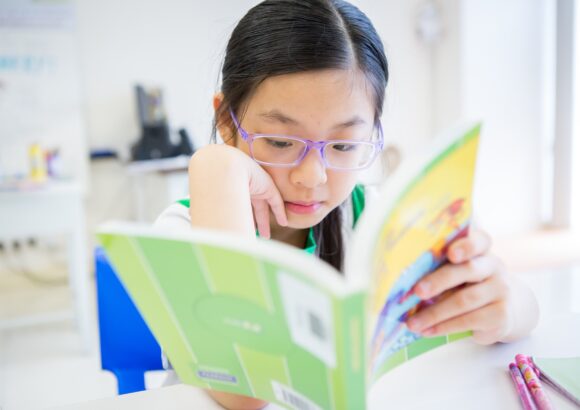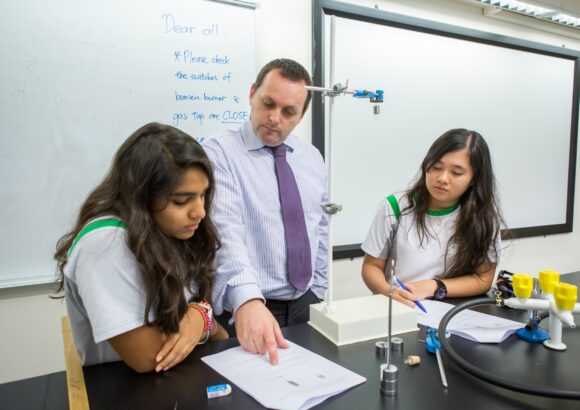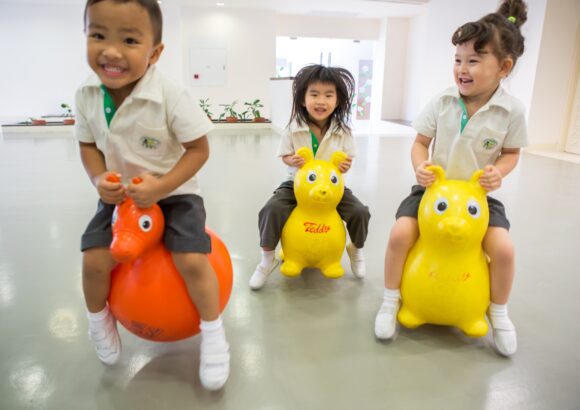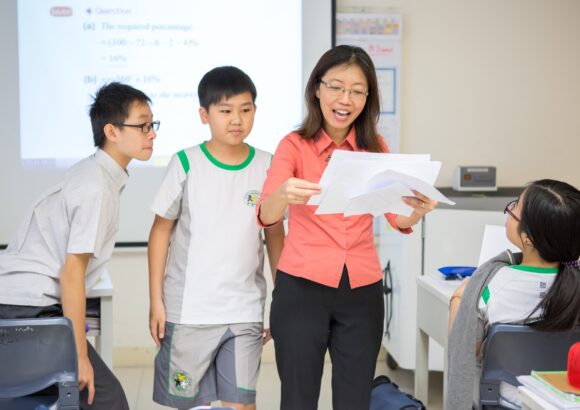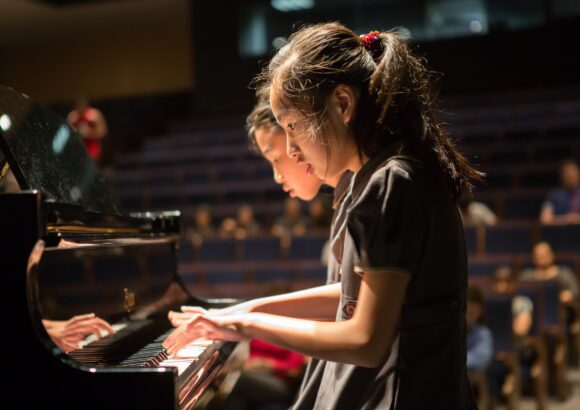My favourite aspects of teaching here at SON are definitely the people – both students and teachers. I have known schools that have caring people in their community, but not to the extent that I have experienced here.
Employment
We warmly acknowledge your interest in joining the vibrant learning community at School of the Nations, in Macau, China. SON serves over 650 students, from age 3 to 19, using integrated teaching practices to nurture the highest standards of intellect, character, and physical development.
Many of our teachers say that their experience at School of the Nations was among the best experiences of their teaching journey. For everyone it is distinctive.
You are cordially invited to learn more about our approach and characteristics to determine if SON is a place you’d thrive.
Application Checklist
Step 1. (3 mins)
Qualifications
Step 2. (3 mins)
Current Openings
Step 3. (3 mins)
Working at SON
Step 4. (5-10 mins)
Learn about SON
Explore our website, including our conceptual framework
Step 5. (5 mins)
FAQ
Step 6. (5-10 mins)
Apply
Qualifications
Requirements of international teachers in Macau are very specific. Before applying, ensure you satsify exactly what’s needed
All applicants must possess a valid passport, will be subject to a criminal record check, and will be required to provide multiple confidential references during the application process. The school hires teachers from all faith backgrounds and does not discriminate based on mother tongue.
Please note that requirements for international teachers in Macau SAR are entirely different than those of Mainland China (and Hong Kong). For instance, in Macau there are no age or country of origin restrictions, while work permit applications typically take months not weeks for approval and require specific documentation about degrees. The government currently all but requires at least two years of teaching experience for international teachers.
Please enquire if you have questions about these local regulations.
Educators who teach Kindergarten and Primary-aged students must have a Bachelor degree and a teaching qualification specifically for that age group. The teaching qualification must be issued by a University and is often a Bachelor of Education for Early Childhood Development or Primary Years, respectively.
The Education Department does not recognize the teaching credentials or certificates of any country, rather it independently examines how it was earned. Accordingly, “teaching licenses” of other countries are not considered and teachers must provide us with a scan of their Bachelor degree and transcripts. There are no exceptions for these documents, except sometimes for new graduates awaiting their certificates. If you know you will not be able to obtain these documents do not apply.
If the Bachelor degree is a not in Education, and your teaching qualifications were earned in another way, e.g. with a one year teaching degree or PGCE depending on your country of study, then a copy of this certificate and transcripts would also be required.
Your teaching qualification must include an in-class practicum (at a daytime school not an educational centre) teaching the age group you will be hired for. Basic evidence of this must also be supplied upon hiring.
The requirements above apply both to homeroom teachers as well as any subject teacher of this age group, be it Art, ICT, Physical Education, or Special Education.
Teachers in Secondary must have a Bachelor degree, or significant undergraduate courses, in the subject they will be teaching. Courses obtained at the Master or Ph.D. level and teaching credentials, unfortunately, cannot be used to satisfy this requirement of the Education Department, but are highly valued by the school.
Teachers must provide us with a scan of their Bachelor degree and transcripts to accompany their work permit application. There are no exceptions for these documents, except sometimes for new graduates awaiting their certificates. If you know you will not be able to obtain these documents kindly do not apply.
The requirements above apply to any subject teacher of this age group, including inclusive learning support and special education.
Teaching assistants and support teachers: these positions typically require candidates with local residence. There are no other requirements to consider before applying.
High-skilled office and administrative workers: the school gives preference to residents of Macau. Indeed, most of these positions require local residence.
Maintenance staff: there are no requirements that need to be considered before applying. Applications can be dropped off at the school reception.
In all of the above cases, requirements listed in the job description will superscede the policies stated above.
Working at SON
What is it like working at School of the Nations? Here is a glimpse.
Student focused
Teachers greatly appreciate that the school, as an institution, and its staff are singularly focused on the wellbeing and education of students.
There is no profit or other motive. Decisions are driven by what is best for students.
High academic standards
The school focuses on nurturing a thirst for knowledge and promotes academic excellence.
While performance on exams is one measure of student learning, we strive to avoid an “exam-driven” culture, and take a more holistic approach to education that emphasizes intrinsic motivation and the role of the acquisition of knowledge in contributing to the well being of society.
Integrating mind & heart
Many teachers are attracted to school’s vision of an integrated approach to the moral and intellectual development of students.
Elements of this approach include innovative programmes offered during character development class periods, as well as through teachers’ exploration of ways to integrate the school’s learner profile into different subject areas.
Professional Development
Registered teachers are entitled to the government’s PD subsidy of at least US$600 per month. Self-selected PD courses can be taken on weekends, evenings, and school holidays.
The school provides standard IB and IGCSE training as needed.
Lesson study and systematic reflection are two key structures for PD school-wide.
SON is also developing its own training programmes that explores the integration of the ideals and principles of its conceptual framework into professional practice.
Collaboration
The school’s curriculum is continually evolving.
We regularly question, assess, and evaluate every aspect of the education we provide.
This requires a harmonized and coordinated approach and calls for close collaboration and shared learning among teachers, our dedicated curriculum team, and others at the school.
Student Discipline
Our school draws on the Cooperative Disciple approach to classroom management. This is part of an effort to avoid approaches to discipline that tend towards extremes of being either punitive or overly permissive.
Genuine Concern
Teachers can begin to feel the care and concern the school has for them as soon as onboarding begins.
Actions the school take carefully considers the needs of teachers, from assistance in finding an apartment, overcoming struggles with work, or dealing with personal difficulties.
Frequently Asked Questions
Recruitment Matters
We begin posting vacancies and actively recruiting new staff in late December for the following school year. However, we also accept unsolicited applications and CVs throughout the year.
The typical time from application to contract offer is usually 2-6 weeks.
These are the usual steps:
- Apply for a position
- Submit a written and video questionnaire
- Online or in-person interview(s)
- Three confidential professional references
- Contract offer (and acceptance)
- Connect or onboarding
- Submit your documents
- Arrival in early to mid-August
Usually there are two interviews, first with a representative from our hiring team, and second with the relevant academic administrator. These interviews will be conducted in-person or using Zoom.
Most teachers really enjoy working at the school.
However, to give prospective teachers an objective idea of what it is like to work at the school we conducted an anonymous survey in 2025 among all teachers. Among those who responded, 93% reported having a sense of meaning and purpose from teaching at SON. At the same time, there was almost universal agreement that some teachers thrive more at the school than others. Most teachers expressed appreciation of the school’s Baha’i-inspired approach to education, reported that the school cares about its staff, and was improving.
For more detailed information, you may read Perspectives of Teachers.
We strive to offer our students international education from a global perspective. Accordingly, we actively seek and are proud of the diversity of our staff and how this shapes the consciousness of our students. Currently, our 100 teachers come from over 20 countries, and about half are from Macau.
We have always hired teachers who demonstrated to us a strong track record or significant potential, and this has included newly qualified teachers. However, we are focused on those with at least two years of teaching experience.
Yes. If both parties are qualified to fill existing vacancies we are happy to hire teaching couples, although this often proves challenging since we have relatively few vacancies.
Yes. However, we cannot make any guarantees about your spouse’s ability to find employment in Macau. The school will not pay the travel expenses for a non-teaching spouse. Finding employment in Macau can be difficult. We advise you to do some research about your spouse’s ability to find work in Macau before you consider accepting a position.
Religious affiliation is not a consideration for teachers or students, and not something the school enquires about.
As you can glean from our Bahai’-inspired framework, we do rely heavily on insights from religion to provide a holistic education. This helps stimulate an orientation towards service and meaningful activities, a desire to sacrifice, rectitude of conduct, and the ability to see nobility in everyone.
Individual teachers, in proportion to their interest and ability, strive to gain a deeper understanding and appreciation of this philosophy and it progressively and naturally tends to find expression both in their actions and attitudes and then in the classroom.
Our school has four main departments with their own administrators. To promote coherence of our educational programmes, all subjects are integrated into these departments, rather than having, for example, a separate Chinese or Arts Department.
Kindergarten includes K1, K2, and K3, with students aged 3-4, 4-5, and 5-6 respectively.
Primary is comprised of Primary 1 to Primary 6, with students aged from 6-7 to 11-12.
Secondary includes Form 1 to Form 6, with students aged from 12-13 to 17-18.
In addition to this formal structure, internally we view Middle School as comprising students from Primary 6 to Form 2.
Regarding our curriculum: the holistic Hidden Gems programme is used in Kindergarten; a variety of sources are drawn from for Primary including Singaporean Maths; Cambridge forms the foundation in Middle School; and in Secondary, IGCSE is offered in Form 3 and 4, and all students participate in IBDP in Forms 5 and 6.
The school receives work permit approval for the teacher before arrival and no action from the teacher is required if they hold a passport (and 30+ days right to visit) from these countries. Otherwise, the teacher would need to obtain a work visa for entry.
- Our contracts for foreign teachers is either 1 or 2 years, and matches the duration of the approved work permit.
- We generally hire teachers who are prepared to work here for at least three years.
- We hope teachers will remain a part of our community beyond this, which many do. Roughly half of international teachers have been at SON for more than 6 years, while the other half are in mostly in their first 3 years. The typical local teacher has been serving for over 6 years.
- There are no financial penalties should a teacher wish to leave after completing one year of a two year contract as the school sincerely wants all teachers to be fulfilled.
- Almost every year the school welcomes back teachers who left SON previously for a variety of personal and professional reasons.
Our school is an English medium school with Mandarin Chinese taught as a language. Speaking Chinese is therefore not a requirement for our English or subject teachers, as Mandarin is taught by specialised teachers.
Yes. Since late 2022 all entry restrictions have been lifted.
The school year usually begins on 1 September, the standard date that teacher contracts begin. Typically, new teachers are requested to arrive a few weeks earlier. The first few days are spent finding and settling into a suitable apartment. This is followed by a few days of orientation for new teachers with the remaining days spent training and planning with all teachers. From the first day of orientation until the end of August new teachers receive an amount equivalent to their daily salary, paid in September.
Kindly note that the schedule above is only confirmed once the new academic calendar is released, usually around May.
Benefits and Daily Life
Our teacher calendar runs from the middle of August until the end of June, with 195 contact days. Newly hired teachers are expected to attend an orientation program in August that begins a few days before returning teachers are required back at the school.
All teachers are expected to work 36 hours per week, which includes up to 22 teaching periods of 42 minutes depending on grade level, along with other duties and responsibilities. Teachers usually have about 5 periods of planning time weekly. Since September 2022, the school no longer requires teachers to be on campus when not involved in teaching or scheduled meetings and events.
Several times during the school year we have working Saturdays to accommodate professional development, staff meetings and parent-teacher interactions. Throughout the school year we observe all Baha’i Holy Days as well as all Macau public holidays. Additionally, there are a number of lengthy breaks throughout the year – including Winter holidays, Chinese New Year, and summer holidays.
The annual base salary for teachers, including housing allowance, is approximately US$44,000, after-tax. This does not include the annual travel allowance, New Year’s bonus, pension contributions, and a yearly re-enlistment bonus which is equivalent to one month’s salary. Furthermore, the government of Macau generously provides a teacher’s professional development subsidy of at least US$600 per month. Taken together, the after-tax total compensation that teachers receive is roughly US$62,000.
Benefits include local healthcare coverage, half tuition for up to two dependents to enroll in the school should one or both parents work at the school, assistance in finding an apartment, and a one-week hotel stay, if needed.
Unlike other schools, there is no pressure or room for salary negotiations since, by law, 70% of school revenue must go toward teachers, and we follow a 6-tier scale based on years of experience. You may freely enquire about your approximate salary amount upon receiving a request for an interview, should this be important.
The school provides international teachers with temporary group insurance upon their arrival in Macau after their work visas are approved. This standard group insurance plan covers basic outpatient and inpatient care (involving overnight hospital stays), and excludes dental coverage. This plan offers worldwide coverage up to the maximums stated in the policy. Teachers above the age of 65 are ineligible for this coverage. Child dependents of staff members will also be registered for coverage under this basic group insurance plan. The school covers up to two dependents under the age of 18. Adult dependents, including spouses, may be added to the group insurance plan at their own expense.
After approximately three to four months, once registration as a teacher is approved by the Education Department (DSEDJ), teachers may elect to continue on the group plan at their own expense. If they choose to do so, the school will pay for up to two dependent children on the basic plan. The cost is approximately $260 USD for the teacher, and the same amount applies should they wish to insure their spouse.
All registered teachers are entitled to comprehensive Governmental Medical and Dental Coverage. This covers both medical and dental treatment, along with specialist cases which may be referred to Hong Kong by local doctors. There is no deductible or co-pay. This coverage does not extend outside of Macau.
New international teachers are connected with several real estate agents and a staff member to help choose an apartment that meets their requirements and budget. Further, teachers from abroad are provided with 7 nights of paid hotel stay during which they can search for accommodations.
There are many furnished and unfurnished flats available in Taipa, within walking distance of the School. Living outside of Taipa, often in Coloane, is also an option due to Macau’s small size and convenient transportation system.
As a rapidly developing destination, the biggest cost of living tends to be apartment rental. Renting apartments near the school can range between $1,000 and $2,300 USD per month depending on size and amenities.
It is usually necessary to pay a deposit of 3 months’ rent upon signing a lease contract. In addition, the real estate agent fee is approximately the cost of one month’s rent. Therefore, teachers need to pay 4 months’ rent when they sign their lease. Various options can be explored at the contract-signing stage of the hiring process if this presents an obstacle.
The lifestyle you choose to live in Macau will determine your cost of living while working here. All teachers can save a sizeable portion of their salary. However, teachers who prefer to live a more luxurious lifestyle or families with several children may struggle to save significant amounts of money during their time here. Teachers who are willing to be flexible with accommodations and live modestly, even with some traveling throughout South East Asia, can save substantial amounts.
To assist prospective teachers to consider this important aspect you may view the results of a 2021 financial survey.
We take protection of your personal data seriously and use it for the application process, and if hired, for employment purposes. Data is safely stored on our cloud-based platforms or on-premises. We only request the minimal personal information that is required and only once it is needed. Lastly, we typically keep applications on file in case another suitable vacancy opens up, but you may request that your application be removed from our application platform.
Macau is a safe, multicultural city located at the center of some of the fastest growing economies and diverse cultures in the world. Connected to Mainland China and just one-hour ferry ride south of Hong Kong, there are many opportunities to experience cultural events, museums, and tastes from around the world. As a former colony of Portugal, Macau has evolved to offer a unique blend of Eastern and Western cultures that cannot be found anywhere else in Asia.
In 2005, the Historic Centre of Macau was awarded the title of UNESCO World Heritage site. With its historic street, residential, religious and public Portuguese and Chinese buildings, the historic centre of Macao provides a unique testimony to the meeting of aesthetic, cultural, architectural and technological influences from East and West.
For more information on Macau please visit any of the following websites:
http://en.wikipedia.org/wiki/Macau
https://www.youtube.com/watch?v=WedPbF5-TCs (short video)
https://www.instagram.com/macaulifestyle
http://www.macaudailytimes.com.mo
